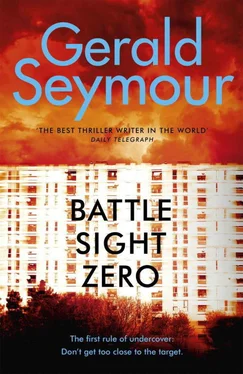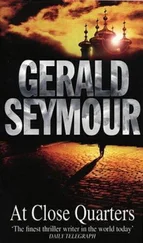‘Have it. I mean, think what’s happening to them, where they’re going, and imagine a bean counter in Langley, Virginia, keeping a watch, making sure that our investment is put to proper use. That the only one of the museum pieces?’
‘The rest are Egyptian, from the Yom Kippur. There’s a bigger stock of them but they’re being held back for further shipments. You people want to see the guys getting them are staying onside.’
‘I seen them close up – no lie, they are fearsome.’
The television showed them occasionally, but the American had been there. Had been a bag carrier, protection for one of the Agency’s senior staffers who was lifted into Afghanistan, not far but over the border, and had made a rallying speech. The American could remember the hard, hairy, tribesmen who had squatted on their haunches and had listened without expression as they were urged to get stuck into a war – a proxy one – and he thought he had recognised men to whom mercy in the field was not considered. Had actually said to the big cheese: ‘Thank the good Lord it’s not us that’s facing that lot and getting them angry, miserable sons of fuckers.’ And his senior had responded: ‘But that’s not going to happen, and they’ll do a good job for us.’
‘Awesome, bad people to mess with.’
‘Enough people have fouled up there. You’d have thought the Soviets would have read history. I’m not weeping tears.’
‘They’ll survive the journey in?’
‘They get a hell of a ride before they start hitting for real. The same with the mortars and machine-guns we had off you.’
The aircraft that the Agency were using had landed at the base a couple of hours earlier, and would now be refuelled and ready for the next leg. A long loop would take it through Saudi air space, and then over Pakistan where it would veer north and cross the southern Afghan border above the mountains of Tora Bora. It would then start a corkscrew descent and come to a pre-designated plateau and flares would guide it and radio signals from guys already on the ground. The crates and medical equipment would be heaved out of the tail of the transport and would flutter down on parachutes.
‘The Kalashnikov has a powerful reputation, and earned . .’
‘Heh, that old one… you see the stock, what’s on it?’
‘What am I looking at?’
‘There’s a gouge out of it, look below that, look at those marks… Those are kills. This rifle, it’s done a bit of heavy lifting. Done its business.’
On the ground, the crates would be split up into lighter loads, put on to the backs of sure-footed, pig-obstinate mules and would go farther north where the mountains were inhospitable to Russian infantry forces, and impassable to heavy armour. The tribesmen would attempt to evade the high-flying helicopters, and along the trail of precipitous paths the weapons would be distributed. The new business would likely involve ambushes of Soviet caravans moving along the narrow, winding roads that linked their base camps.
‘Too right, and where it’s going it’ll do some more.’
The top was fastened on the last crate and the nail hammer sealed it. A fork-lift would carry it out to the aircraft where straps would go round it, and a parachute attached, and if the landfall was good then the kit would be ready to go, do some killing.
‘Do you need to answer it?’ Menace in the voice.
Hamid said that he did not.
‘If you need to answer it, you do that. What you do not do is dither with me, listen to what I say, look at your phone, answer what I say, look at your phone. Always your fucking phone. Do I look at my phone?’ Tooth had an ability, considerable, to speak softly, as if in conversation and to imply infinite threat.
The texts were jumping on to Hamid’s phone screen. The gutless little shites who had ridden with his brother – useless and incompetent – were sending them. Nothing from Karym.
Tooth had summoned him to a small open space overlooking the north side of the harbour, beyond the fortified position of Saint-Nicolas. The garden was named after the Resistance fighter, Missak Manouchian, who had been betrayed, arrested and shot by firing squad with 22 colleagues at a gaol in Paris. His bust was on a plinth. Hamid believed, had no reason to doubt it, that Tooth did very little that was not planned and thought out. The meeting in the garden was not by chance, or convenience. Tooth had explained. The fighter had not been captured because of the skill of the Gestapo officers, but because of treachery, one of his own. Hamid understood. As clear as any lecture, was the message that treachery and betrayal was the greatest crime. A traitor, a betrayer, had nowhere to run, would be hunted down, would die badly. The message was simply put… they had then talked about the arrangements to be made.
He had been listening, simultaneously examining the bird droppings on the head of the executed fighter, when his first text had come. The kids with Karym had fled. They had abandoned his brother, had also abandoned the satchel his brother carried, full of cash. To be in the presence of a man of the reputation such as Tooth’s was a matter of esteem for Hamid. To have been chosen by Tooth was a step forward in his career that Hamid had not dreamed of, and he was being scolded as his mother might once have done. He would not have taken the soft-spoken criticism from any other man in the city, certainly not from the biggest personality in La Castellane. Tooth was on a higher level.
He shrugged, said vacantly, ‘They come the whole time. A message and another message and another and… I had a problem.’
‘Always better if a problem is shared. You wish to tell me?’
‘I have a brother, a kid.’
‘You have a brother, and you go to a meeting that is important to you, and you are on your phone which is insulting – and you have a kid brother.’
‘He was ambushed, in the fourteenth arrondissement .’
‘Why was he ambushed?
‘He was carrying money. He was knocked off his scooter by a car. He was in the road. The people who ambushed him are Somalis and from Saint Barthélemey. But the scooter fell on one of them, and has broken his leg.’
‘And now?’
‘My brother is in the road, still has my money. On top of him is a Somali with a pistol but he cannot move. On top of them both is a scooter. The street is blocked by the police. The kid with the pistol is hysterical. Look… please…’
Hamid showed pictures from his phone. Blurred, indistinct, a mess of legs and arms and what could have been a head, and an empty road and a scooter on its side with one wheel sticking up.
‘How much is the money?’
‘A hundred thousand euro. It is half a week’s trade.’
‘Are you more concerned for your brother’s life, or for your money?’
He did not answer, did not wish to lie. His arm was punched, surprisingly painful because the fist was bony and angular, and it was meant to hurt.
‘It is in place, what will happen, our business… I like a man who understands what is a priority – you should hope that your brother survives, and you should do what you can to safeguard your money, and there is me, myself – Tooth. Above all, you delay going to your brother, and you delay concerning yourself with your money because you have to talk with me, you show flattering respect.’
Hamid stood, turned away, and heard a mocking cackle of laughter behind him.
They were left. Ignored, not brought coffee nor bread rolls, nor told what was the plan, not given any real indication as to why they were there.
Pegs shared her peppermints with Gough. She said that she found the situation ‘stimulating’ and he said – chewing his mint – that it ‘set the juices flowing’. They did not complain, nor seek to attract attention.
Читать дальше












